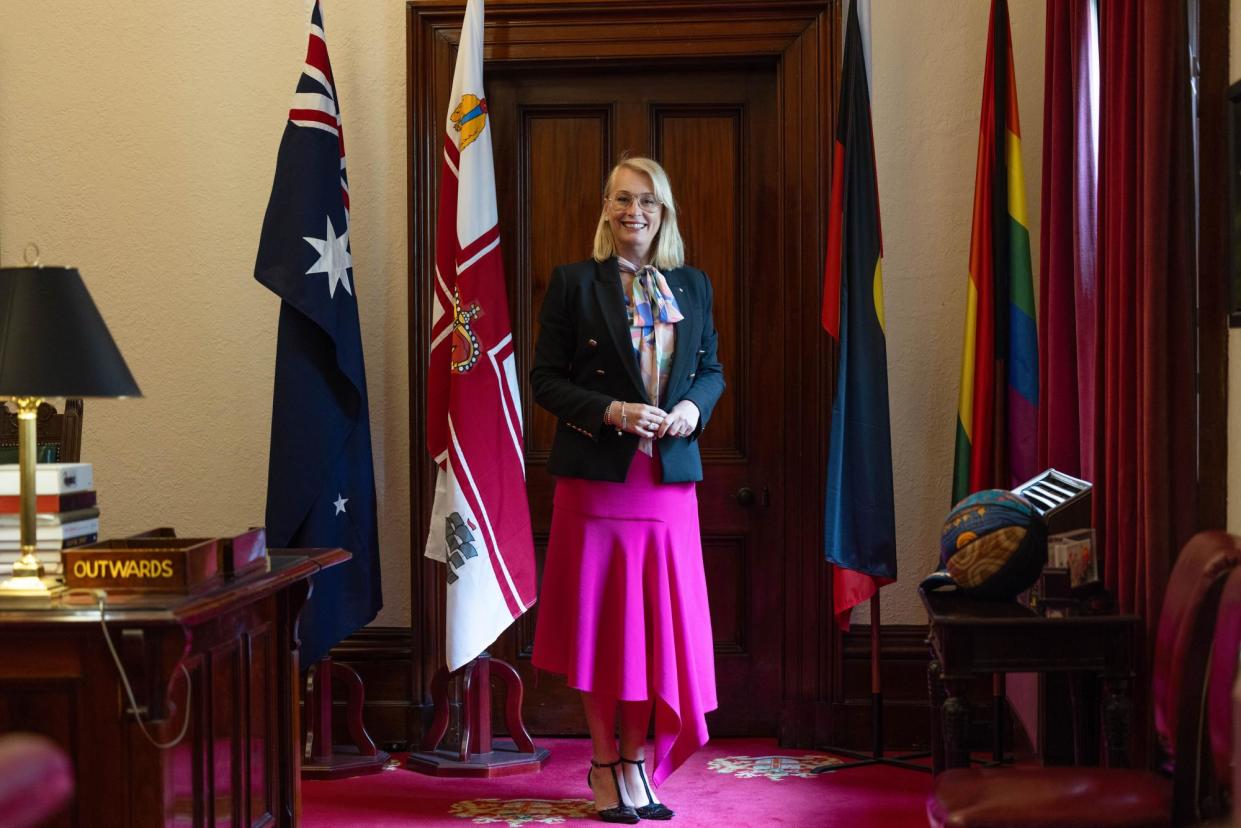Sally Capp looks back on six years as Melbourne lord mayor

Whether she’s posing with jazz hands outstretched for a festival launch or hosing down statues to spruik city cleaning initiatives, Sally Capp has been a ubiquitous presence in Melbourne for six years.
Zesty optimism has been a signature trait during her tenure as Melbourne’s lord mayor, but it hasn’t always won her plaudits.
In a 2022 TEDx talk she declared the Covid-19 pandemic had been good for Melbourne, saying the city had emerged bruised but also bolder and braver than before. Business owners decried the comments after the city’s emergence from one of the world’s longest series of lockdowns.
But ask the departing city leader how the term “pandemic mayor” sits with her and there is no hesitation.
“I’m completely comfortable with that. It’s a shared experience,” she says.
“Even though we’re the city with one of the longest days in lockdowns, the mark of our character is how we responded during those lockdowns, during the bounce backs. What we see today, that trajectory is truly admirable and exciting.”
Capp, Melbourne’s first directly elected female mayor, will leave the role in June after six years. At 56, she cites wanting to explore new opportunities and having given her all to the role as reasons for the departure, noting she had spent all of her 50s at town hall. Capp will hand the reins over to the deputy lord mayor, Nicholas Reece, who is widely expected to run for the top job.
Her tenure has at times been subject to bitter criticism in the conservative media and on social media. Capp won a 2018 byelection when town hall was engulfed in scandal after her predecessor, Robert Doyle, resigned after allegations of sexual harassment.
The city she helmed during those dark days is recovering. In the first two months of the year, Melbourne city recorded its highest foot traffic since 2015, largely driven by major events like Taylor Swift’s Eras tour.
Capp has championed the city’s new rhythm, with Friday and the weekends now the most popular times in the CBD, exceeding pre-pandemic foot traffic levels. But challenges remain – enticing city office workers back on Mondays and Fridays has proved difficult.
During the prolonged lockdowns, Capp faced criticism from Melbourne’s business sector for not pushing back enough on the lockdowns imposed by the Andrews government, due to the crippling impact on city traders.
Capp points to joint initiatives with the state government, an initial $100m Melbourne city recovery fund and a further $200m revitalisation fund – including a voucher scheme to support CBD businesses – as examples of how council fought for the city’s devastated businesses.
“There’s still work to do, absolutely,” she says.
“We see that in the news every day, it’s in my emails, it’s in the conversations in the streets”
Capp, the former Victorian head of the Property Council of Australia, had a trail-blazing career in the business sector prior to running for public office. She acknowledges she was politically naive when she was elected mayor, but says it allowed her to commence the role without a jaded perspective.
The council’s rollout of CBD bike lanes – paused in 2022 – has been dubbed a “war on cars” due to the loss of road and parking space, while Capp’s use of a private limousine – totalling more than $30,000 in ratepayers funds – has sparked fierce media coverage.
During her walks through the city and meetings with stakeholders, Capp fields questions on an array of council matters but describes the conversations as a “challenge to improve” when there is disagreement.
“Most of the vitriol comes from people sitting a long way away from the reality, or armchair commentators or professional commentators, and I don’t see the value of that type of commentary and criticism,” she says.
She acknowledges the vitriol is one of the hardest parts of her job.
“I won’t say it doesn’t hurt. It hurts. But they’re flesh wounds,” she says.
“I think a lot of what I’ve received is very gendered, even commenting on what I look like, things that are beyond an issue or a project that are very personal.”
“Some of the tenor or the tone, the innuendo those sorts of things have been very unfair but what’s really disappointing is they actually distract from the issue.”
Reece, who previously worked as a senior adviser to Julia Gillard, draws parallels between the gendered treatment of the former prime minister and Capp.
“I’ve seen first-hand the specific challenges that women face in senior political roles,” he says.
“Some of these issues I’ve seen again with Sally Capp”
Announcing her resignation last week, Capp singled out several major projects as her legacy – the Queen Victoria Market redevelopment, the Greenline project and Make Room – the conversion of a council-owned building into homelessness accommodation and support services – but all are yet to be finished. The completion date and funding remains unclear for the $316m Greenline, a planned 4km of interconnected promenades and parks on the north bank of the Yarra River.
But Capp says she is proud to have overseen projects that will “go beyond my time” and “haven’t just been focused on short-term initiatives to fit in with an election cycles”.
“We’ve actually been making decisions that are good for the city even if we know that we won’t get to have a photo, or cut a ribbon,” she says.
Capp’s successor will face what she describes as the “deep” to-do list in office.
How they steer the unfinished projects is likely to define Capp’s stamp on the city.


